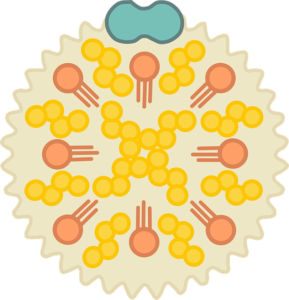Egg Storage: How to Keep Eggs Fresh and Safe for Longer, Amazing Egg Art
Egg Storage: How to Keep Eggs Fresh and Safe for Longer, How long do eggs last, How to store eggs in the refrigerator, Store your eggs in their original carton, Store your eggs with the pointed end down, Egg Art, Galaxy Eggs, Pantone Eggs, Moroccan Eggs, Mood Ring Eggs, Floral Watercolor Eggs
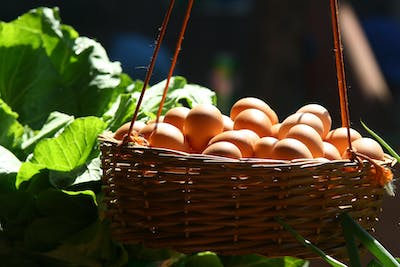
Close-up human hands put chicken eggs in the egg-laying compartment in the refrigerator. Eggs are a staple food in many cuisines and cultures around the world. They are versatile, delicious, and easy to prepare. But did you know that eggs are also one of the most perishable foods in your kitchen? If you don’t store them properly, they can spoil, dry up, or become contaminated with harmful bacteria. In this blog post, you will learn how to store eggs correctly to keep them fresh and safe for longer. You will also discover some tips and tricks to test the freshness of your eggs and use them in various ways.
How long do eggs last?

The shelf life of eggs depends on several factors, such as the date of production, the type of packaging, the storage temperature, and the handling methods. According to the USDA, eggs can last for 3 to 5 weeks in the refrigerator after the sell-by date, which is usually 30 days after the pack date. However, this is only a general guideline, and the actual freshness and quality of your eggs may vary depending on the conditions.
To ensure the safety and quality of your eggs, you should always check the expiration date on the carton and follow the storage tips below. You should also use your senses and common sense to determine if your eggs are still good to eat. If your eggs smell, look, or taste bad, or if you have any doubts about their freshness, it’s best to discard them.
How to store eggs in the refrigerator
The refrigerator is the best place to store your eggs, as it keeps them at a constant and low temperature. However, there are some dos and don’ts to follow when storing eggs in the fridge. Here are some tips to keep in mind:
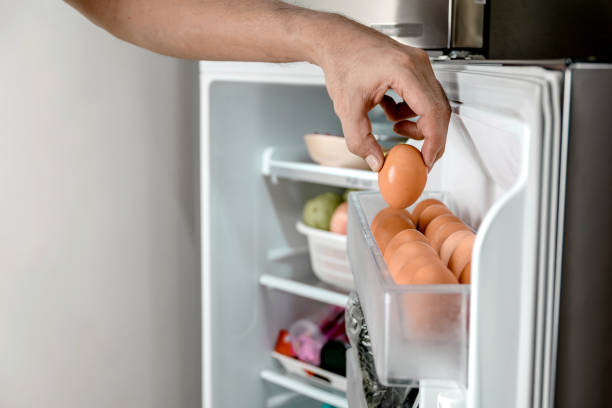
- Store your eggs in their original carton. The carton protects the eggs from absorbing odours and flavours from other foods, and it also prevents moisture loss. The carton also has the expiration date and the pack date, which can help you keep track of your eggs’ freshness.
- Don’t store your eggs in the door of your fridge. The door is the warmest and most fluctuating part of your fridge, which can affect the quality and safety of your eggs. Instead, store your eggs on an inside shelf, preferably in the back, where the temperature is more stable and consistent.
- Store your eggs with the pointed end down.
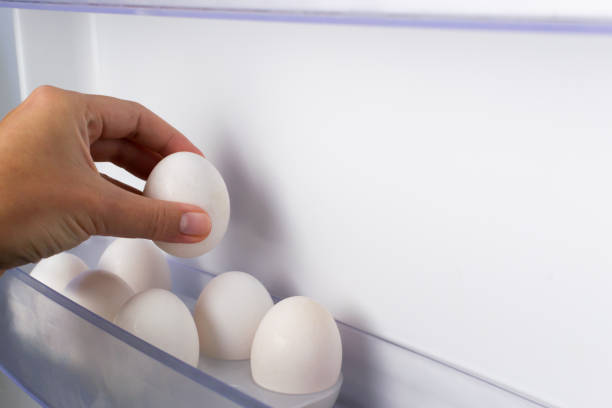
Egg Storage. Pointed Side Down This helps keep the air cell, which is a small pocket of air inside the larger end of the egg, in place. The air cell can help the yolk stay centred and prevent the egg from drying out. Storing your eggs with the pointed end down can also reduce the risk of bacterial contamination, as the shell is less porous at that end.
- Don’t wash your eggs before storing them. Washing your eggs can remove the natural protective coating called the cuticle, which helps prevent bacteria from entering the shell. Washing your eggs can also increase the moisture on the shell, which can promote bacterial growth. You should only wash your eggs right before using them, and use warm water and mild detergent.
- Store your eggs separately from raw meat, poultry, and seafood. These foods can harbour harmful bacteria, such as Salmonella, which can cross-contaminate your eggs if they come into contact. You should also avoid storing your eggs near strong-smelling foods, such as onions, garlic, or cheese, as they can affect the flavour of your eggs.
How to store eggs in the freezer
If you have more eggs than you can use within a few weeks, you can freeze them to extend their shelf life. However, you should never freeze eggs in their shells, as they can crack and leak. You should also avoid freezing hard-boiled eggs, as they can become rubbery and watery. Here are some steps to follow when freezing eggs:

- Crack the eggs and separate the whites and yolks. You can freeze them separately or together, depending on how you plan to use them later. You can also freeze whole eggs without separating them, but make sure to whisk them lightly first.
- Add some salt or sugar to the yolks or whole eggs. This helps prevent them from becoming gelatinous and thick when frozen. You can add 1/8 teaspoon of salt or 1-1/2 teaspoons of sugar or corn syrup per 1/4 cup of yolks or whole eggs (4 large eggs). Label the container with the type and amount of the additive, as it can affect the taste and texture of your dishes.
Transfer the eggs to a freezer-safe container. You can use an ice cube tray, a muffin tin, or a plastic bag. Make sure to leave some space for expansion, and seal the container tightly. Label the container with the number and type of eggs
Egg Art
Egg art is a creative way to decorate eggs with different techniques and materials. You can use eggs to make beautiful and unique designs for Easter, spring, or any occasion. Here are some ideas for egg art that you can try:
- Galaxy Eggs: You can create a stunning effect by painting your eggs with metallic gold paint and then adding glitter or sequins to make them sparkle like stars. You can also use a black marker to draw galaxy patterns on the eggs. This technique is inspired by the modern gold Easter eggs from 20th Century Studios1.
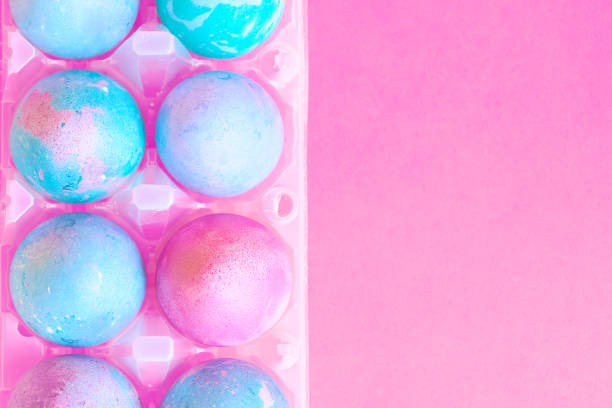
- Pantone Eggs: If you want to add some colour to your eggs, you can use Pantone paints or markers to dye them in different shades. Then, you can use inkjet tattoo paper to print the corresponding number on each egg. This way, you can create a rainbow of eggs that match your outfit or mood2.
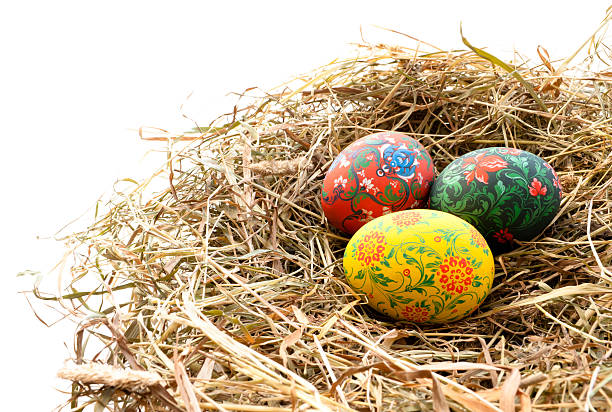
Decorated eggs in the hay for the holiday of Easter
- Moroccan Eggs: Using pastel colours and geometric patterns, you can bring some exotic flair to your eggs. You can use a sponge or a brush to dab the colours on the eggs, creating swirls and dots. You can also use a toothpick or a skewer to poke holes in the eggs and fill them with cotton balls or beads3.

Moroccan Eggs
- Mood Ring Eggs:
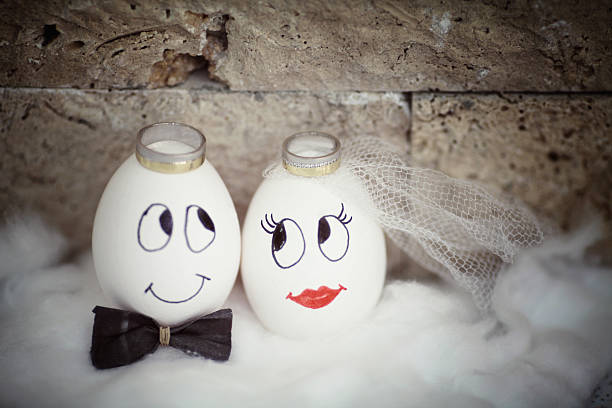
Mood Ring Eggs: You can make your mood ring by painting your eggs with special mood paint that changes colour when you hold them in your hand. The paint contains pigments that react to heat, so it will change colour depending on how hot or cold your hand is. This technique is inspired by the mood ring Easter eggs from Lovely Indeed4.
- Floral Watercolor Eggs:

Easter Eggs in a Crate You can create a delicate and elegant look by painting your eggs with watercolour paints and then adding dried flowers or leaves as embellishments. You can use any flowers that you like, such as roses, daisies, lavender, or eucalyptus. You can also use different techniques such as splattering, stamping, or masking to create different effects5.
These are just some of the many ways that you can create beautiful and unique designs with eggs. Egg art is not only fun but also eco-friendly, as it uses natural materials and reduces waste. I hope you enjoy trying out these ideas and have a wonderful time decorating your eggs!
